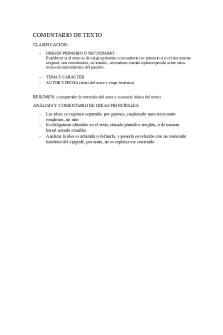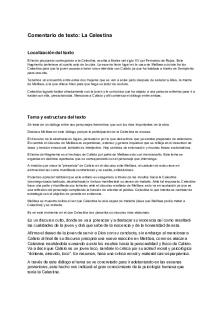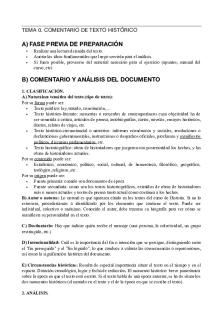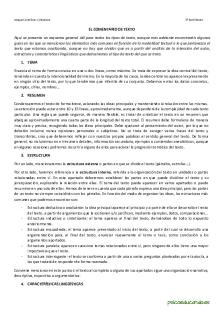Comentario de texto: Queen Elizabeth I’s Speech to the Troops at Tilbury PDF

| Title | Comentario de texto: Queen Elizabeth I’s Speech to the Troops at Tilbury |
|---|---|
| Author | Ryan Gornall |
| Course | Estudios Ingleses: Lengua Literatura Y Cultura |
| Institution | UNED |
| Pages | 5 |
| File Size | 105.8 KB |
| File Type | |
| Total Downloads | 103 |
| Total Views | 140 |
Summary
Comentario de texto PEC 1º trimestre MUNDOS ANGLÓFONOS EN PERSPECTIVA HISTÓRICA Y CULTURAL...
Description
09/12/2012 RYAN GORNALL X-7182296V
Queen Elizabeth I’s Speech to the Troops at Tilbury, 1588
“My loving people, We have been persuaded by some that are careful of our safety, to take heed how we commit ourselves to armed multitudes, for fear of treachery; but I assure you I do not desire to live to distrust my faithful and loving people. Let tyrants fear, I have always so behaved myself that, under God, I have placed my chiefest strength and safeguard in the loyal hearts and good-will of my subjects; and therefore I am come amongst you, as you see, at this time, not for my recreation and disport, but being resolved, in the midst and heat of the battle, to live and die amongst you all; to lay down for my God, and for my kingdom, and my people, my honour and my blood, even in the dust. I know I have the body but of a weak and feeble woman; but I have the heart and stomach of a king, and of a king of England too, and think foul scorn that Parma or Spain, or any prince of Europe, should dare to invade the borders of my realm; to which rather than any dishonour shall grow by me, I myself will take up arms, I myself will be your general, judge, and rewarder of every one of your virtues in the field. I know already, for your forwardness you have deserved rewards and crowns; and We do assure you in the word of a prince, they shall be duly paid you. In the mean time, my lieutenant general2 shall be in my stead, than whom never prince commanded a more noble or worthy subject; not doubting but by your obedience to my general, by your concord in the camp, and your valour in the field, we shall shortly have a famous victory over those enemies of my God, of my kingdom, and of my people.”
Mundos Anglófonos en Perspectiva Histórica y Cultural
09/12/2012 RYAN GORNALL X-7182296V
CLASSIFICATION This speech would be classified as a historical-narrative text and was delivered by Queen Elizabeth I to the troops at Tilbury on 2nd August 1588. This speech was given in order to provide them with the will and courage in anticipation of an attack from the Spanish Armada, also known as the “Invincible Fleet”, led by the King of Spain, Felipe II. This version of the speech has become the most famous rendition, despite the existence of other versions. It was recorded by Dr. Leonel Sharp in a letter to the Duke of Buckingham, and is thought to have been written after the Duke of Buckingham’s 1623 marriage expedition to Spain. Before Elizabeth’s accession, Mary I was the Queen of England and married to Felipe II, King of Naples, and later, King of Spain. Felipe had been co-monarch of England until Mary’s death. Felipe was a devout Roman Catholic and considered the Protestant daughter of Henry VIII and Anne Boleyn, Elizabeth, to be an illegitimate ruler of England. Felipe favoured Elizabeth’s Catholic cousin and presumptive heir, Mary Queen of Scots, but was thwarted when Elizabeth had her executed in 1587. Elizabeth continued to advance the cause of Protestantism and supported the Dutch Revolt against Spain. Felipe deemed this action as an act of war and began preparing an invasion, with the support of Pope Sixtus V, of England with the plan to restore Catholicism. Queen Elizabeth I ruled England and Ireland from 17 th November until her death on 24 th March 1603. Often referred to as “The Virgin Queen” she was proclaimed Queen at the age of 25 when Mary I, her half-sister, died in 1558 without an heir to the throne. Mary, before her death, recognised her sister as heir to the throne. Later, Queen Mary died and Elizabeth’s accession took place. This accession was greeted with whole-hearted enthusiasm. On 15 January 1559, her coronation was and then one of the most glorious periods in its history. On 12th July 1588, the Spanish Armada set sail for the channel to rendezvous with the Duke of Parma’s army and attack the coast of southeast England. However, due to a miscalculation and misfortune, a storm struck the English Channel and there was a tightly fought battle against the English Navy. The English fleet defeated the Armada, and were forced to retreat via the North Sea. Although the Spanish fleet was severely damaged, the English army could not discount the threat of further invasions along the coast. The Earl of Leicester commanded 4,000 soldiers to Tilbury, Essex to defend the Thames Estuary. He also invited Elizabeth to Tilbury to inspect her troops. Wearing a silver breastplate over a white velvet dress, Elizabeth gave a speech encouraging her forces. The Queen’s speech was aimed at the 4,000 troops at Tilbury, which would have to fight against the Spanish ships to defend their country. However, as Elizabeth addressed the speech to her “loving people” and made references “to live and die amongst you all” it may be considered that the speech was intended for the entire nation as a message of unity and strength against a foreign enemy. Subsequently, no invasion came to Tilbury, and the Spanish Armada fled for Spain, sailing around Scotland and Ireland into the North Atlantic. The English public celebrated and Queen Elizabeth’s procession to a thanksgiving service at St. Pauls Cathedral was a grand spectacle.
Mundos Anglófonos en Perspectiva Histórica y Cultural
09/12/2012 RYAN GORNALL X-7182296V
ANALYSIS With the Spanish Armada, a seemingly invincible force, moving towards the coast of England, Queen Elizabeth I delivers an inspiring speech to her troops in Tilbury. She speaks in a way to reject any opposition to her position and to dispel any worries about her capabilities. It is through her command of diction, imagery and sentence structure that she succeeds in motivating her troops to confront an imposing enemy. Queen Elizabeth is very careful with her diction, making sure to emphasize the respect she has for the public and especially her troops, praising her “faithful and loving people” and the “loyal hearts and good-will of [her] subjects”. The Queen uses these terms to establish a bond with the troops, and shows that despite being their leader, she is far removed from the daily trials of military life just as the troops are far removed from court life. The Queen’s use of diction; however, is not limited to the praise, but is also used as a means of diminishing the prestige of the enemy and provoking violent emotions. After claiming to have the fortitude of any king of England, she goes on to “think foul scorn that Parma or Spain, or any prince of Europe, should dare invade the borders …” This phrase is notable both as an example of contempt and in its description of the leaders of Europe as mere princes, inferior to the preceding “king of England.” The word “scorn” is very harsh sounding, and Elizabeth’s use of it here, accompanied by “foul” is an obvious expression of contempt; it is both an insult and an appeal for the troops to think the same. The description of the Spanish leader as a “prince” and the mention of Europe are intended to accomplish two things: to demean the majesty of the King of Spain, making him more human and making it easier for the troops to fight fearlessly against the foreign. The Queen uses imagery to dispel arguments, excite emotion, and create confidence. In the first sentence of the speech, rather than creating images, she anticipates and refutes them. She foresees that many would have images running through their heads of crazed citizens in “armed multitudes” committing acts of “treachery” against the kingdom, acknowledges the arguments others have made to that end and then dispels them, praising her “faithful and loving people” as the reason that she can reject such predictions of disaster. She thus accomplishes two goals: to diminish the fear brought forth by competing arguments and to appeal to the troops’ high opinions of themselves and their countrymen. Elizabeth goes on to use imagery in an emotional appeal as she creates the image of herself riding alongside the troops in the “heat of battle” willing “to live or die amongst [them] all.” Presented in a climactic form, she ends with an image of blood dripping from her battle wounds. Such imagery is presented to rouse the spirits of the troops both toward the impending battle and the honour of fighting with their competent and courageous leader. And then her final use of imagery is attentive to the troops’ reluctance to genuinely accept her leadership as a woman, she cloaks herself in the archetype of an English king: I know I have the body but of a weak and feeble woman; but I have the heart and stomach of a king, and of a king of England too… She acknowledges her shortcomings but then creates an image that emphasises her strengths comparing them to that of any other English king. This final use of imagery establishes her position of authority while working toward a climax, beginning with the “weak and feeble” image and ending with the personification of strength and bravery, the “king of England.” While diction and imagery may provide the spirit of the speech, it is the sentence structure that forms the body. Elizabeth uses her schemes and figures of speech to impress her points, affirm her authority, and predict certain victory. The Queen, intent on establishing common ground with the troops, proclaims: Let tyrants fear, I have always so behaved myself that, under God, I have placed my chiefest strength and safeguard in the loyal hearts and good-will of my subjects…
Mundos Anglófonos en Perspectiva Histórica y Cultural
09/12/2012 RYAN GORNALL X-7182296V
This statement is meant to define the relationship between her and the troops as one of mutual faith while she continues to discredit those who would be more distrusting - the tyrants. The tyrants clause positioned next to the remaining clauses is an example of antithesis, contrasting the distrusting mind of the tyrant with the trusting nature of the Queen who, after God, puts her faith in her people. Later on in her speech she states: I myself will take up arms, I myself will be your general, judge, and rewarder of every one of your virtues in the field. The repetition of “I myself will” at the beginning of the two clauses works to illustrate the level of commitment the Queen has toward the troops and evokes an aura of confidence. At the end of the second clause, she names the increasingly prestigious positions that encompass all of her duties. She will not only guide the troops, but judge their actions and reward them accordingly. While these positions emphasize her position as supreme, it is weakened by the concluding phrase: “of every one of your virtues in the field.” Of course, not all of the soldiers are going to be courageous or “virtuous” but by implying that they will be the Queen demonstrates her trust in the troops. The next sentence goes on to reinforce this point as she speaks of “rewards and crowns.” In the concluding sentence she reasons that because the troops will obey their general, will respect each other, and will fight bravely against the enemy, it is inevitable that a “famous victory” should result. This line of reasoning is swift, leaves little time for analysis, comes to a favourable conclusion and although it is faulty, achieves its purpose of arriving at victory before the fighting has even begun. Queen Elizabeth constructs her speech to match her audience, to move that audience to action, and to make that audience enthusiastic about the action. She establishes a bond, points out the enemy, proclaims her confidence, and predicts victory. Yet, the speech is not only intended to be an explanation of why the troops are going to war but is meant to bond the Queen to her troops and create trust while deflecting criticism.
Mundos Anglófonos en Perspectiva Histórica y Cultural
09/12/2012 RYAN GORNALL X-7182296V
CONCLUSION Queen Elizabeth I’s reign has often been depicted as the golden age in English history by historians. It was an age of intense religious passions, largely due to the creation of the Church of England by Elizabeth’s father Henry VIII. Queen Elizabeth managed to tone down the religious conflicts within England, but England remained far from united. The Queen had a fairly low status across Europe as she was regarded as an illegitimate child of King Henry VIII and his second wife, Anne Boleyn, since the Pope had not sanctioned Henry's divorce from his first wife, Catherine of Aragon. As a bastard, Elizabeth was considered to have no right to the English throne. Furthermore, her father's break from the Roman Catholic Church made her an enemy to Catholics both in and outside England who regarded her distant cousin, Mary, Queen of Scots, as the rightful sovereign. During Elizabeth's reign, England was constantly under danger of attack from the great Roman Catholic powers, Spain and France, encouraged by the Pope. Against these threats, the Queen could rely only on her own wits, and above all, her talent for creating a cult of personality. Elizabeth secured her position by creating a glorious public image that overwhelmed religious differences and appealed directly to English patriotism. In order to win her subjects over, she needed to be visible and, in an age of slow communications, that meant undertaking many royal progresses. Her speech at Tilbury is a perfect example of how she was able to portray herself as a leader. Once England was successful in defeating the Spanish Armada, in the weeks and years that followed Elizabeth was depicted as a powerful political icon, and highly praised in her leadership in defending her country. To conclude, I think that this speech is one of the many events that defined Queen Elizabeth and England during this time. Elizabeth understood the importance of her image in the public eye, and was able to use many stages in order to influence her peoples’ opinion of her. Throughout her 44year reign her leadership and strength helped establish a stable kingdom and a sense of national identity. Over time she became admired and feared by her own people as well as her enemies. In 1558 Pope Sixtus described her: “She is certainly a great Queen and were she only a Catholic she would be our dearly beloved. Just look how well she governs! She is only a woman, only mistress of half an island, and yet she makes herself feared by Spain, by France, by the Empire, by all...”
Mundos Anglófonos en Perspectiva Histórica y Cultural...
Similar Free PDFs

Modelo Comentario DE Texto
- 1 Pages

Comentario de texto Celestina
- 3 Pages

Comentario de texto MARX
- 4 Pages

Comentario de texto Runas
- 3 Pages

Esquema comentario de texto
- 3 Pages

Herodoto comentario de texto
- 9 Pages

Comentario de texto
- 7 Pages

Dewey, comentario de texto
- 7 Pages

-EL Comentario DE Texto
- 3 Pages

Comentario de texto latín
- 4 Pages

Lengua Comentario de texto
- 2 Pages

Comentario de texto resuelto
- 3 Pages

Comentario DE Texto Historico
- 4 Pages

Comentario de texto
- 2 Pages
Popular Institutions
- Tinajero National High School - Annex
- Politeknik Caltex Riau
- Yokohama City University
- SGT University
- University of Al-Qadisiyah
- Divine Word College of Vigan
- Techniek College Rotterdam
- Universidade de Santiago
- Universiti Teknologi MARA Cawangan Johor Kampus Pasir Gudang
- Poltekkes Kemenkes Yogyakarta
- Baguio City National High School
- Colegio san marcos
- preparatoria uno
- Centro de Bachillerato Tecnológico Industrial y de Servicios No. 107
- Dalian Maritime University
- Quang Trung Secondary School
- Colegio Tecnológico en Informática
- Corporación Regional de Educación Superior
- Grupo CEDVA
- Dar Al Uloom University
- Centro de Estudios Preuniversitarios de la Universidad Nacional de Ingeniería
- 上智大学
- Aakash International School, Nuna Majara
- San Felipe Neri Catholic School
- Kang Chiao International School - New Taipei City
- Misamis Occidental National High School
- Institución Educativa Escuela Normal Juan Ladrilleros
- Kolehiyo ng Pantukan
- Batanes State College
- Instituto Continental
- Sekolah Menengah Kejuruan Kesehatan Kaltara (Tarakan)
- Colegio de La Inmaculada Concepcion - Cebu

